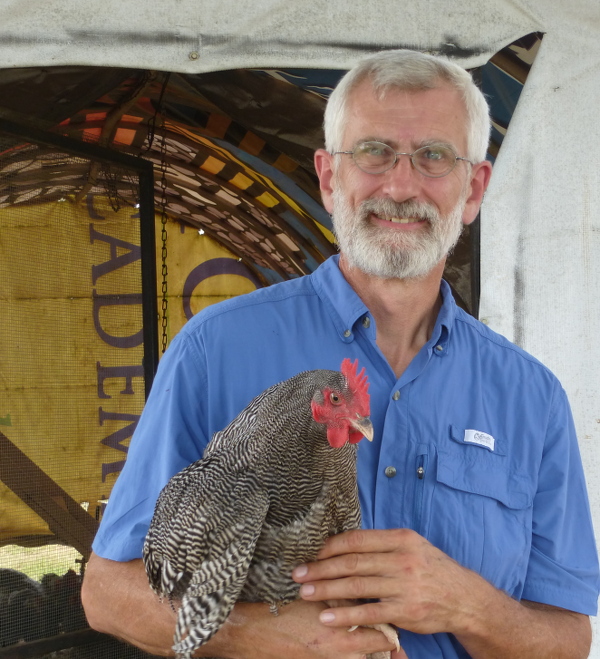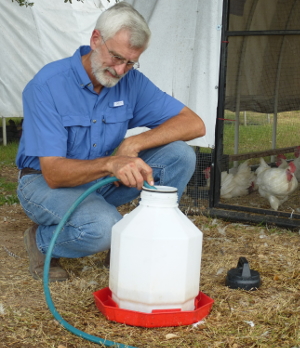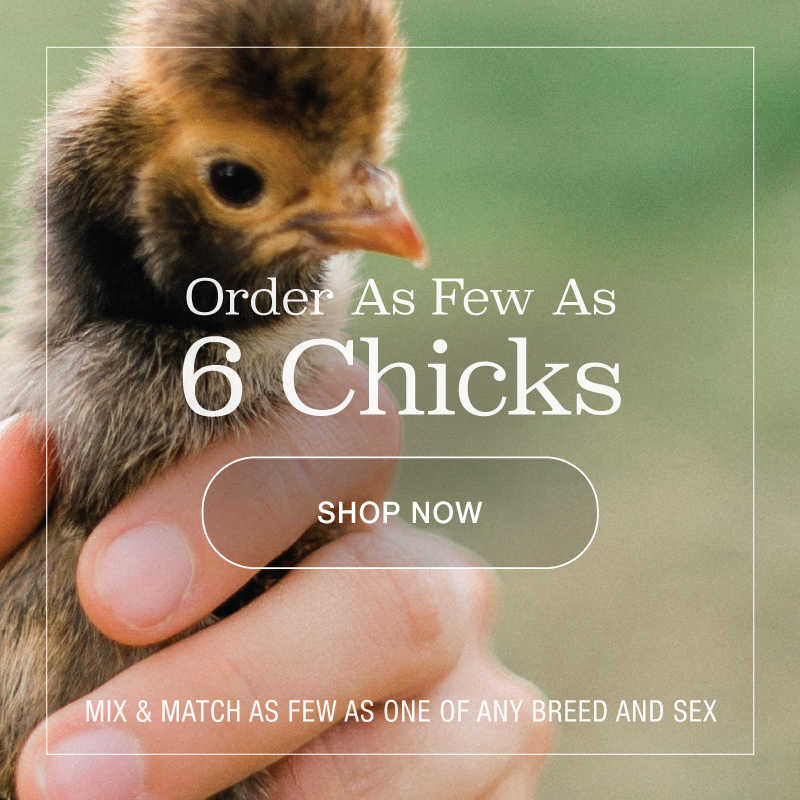 Background: Joe Claborn has worked with McMurray Hatchery for many years and currently raises started chicks and started pullets for McMurray. Joe is also involved with a project that Bud Wood, president of McMurray Hatchery, initiated to start backup flocks for many of McMurray’s rare breeds during the current Avian Flu outbreak.
Background: Joe Claborn has worked with McMurray Hatchery for many years and currently raises started chicks and started pullets for McMurray. Joe is also involved with a project that Bud Wood, president of McMurray Hatchery, initiated to start backup flocks for many of McMurray’s rare breeds during the current Avian Flu outbreak.
This is part 3 of a three-part interview (see part 1 and part 2 of the interview).
Q: What prompted you to start raising birds on this scale?

McMurray’s one-page website in 1997
(from the Internet Archive Wayback Machine)
Joe Claborn: Part of it is that I’ve had a long and very fruitful relationship with McMurray Hatchery. Years ago, when we first started to look into raising chickens, my dad and my sons had built a coop in our little backyard, and we looked online to try to find a place to buy chickens. At the time, McMurray Hatchery had a little one page website.
I was working for a small internet company at the time and I said to my manager, “We should build them a new website. If you can sell chicks online you can sell anything.” So we did. We built them their first e-commerce website, and I’ve been working with them ever since.
 But eventually, I got to the place to where I wanted to do more than work at a computer all day. I really wanted to be able to do something where I could express care — not only care for the chickens, but also care for the people that would receive the chickens. And I wanted to do something that involved more of my family so that I could express more care into their lives, and transfer my passion for care into them, teaching them to care.
But eventually, I got to the place to where I wanted to do more than work at a computer all day. I really wanted to be able to do something where I could express care — not only care for the chickens, but also care for the people that would receive the chickens. And I wanted to do something that involved more of my family so that I could express more care into their lives, and transfer my passion for care into them, teaching them to care.
I was talking to Bud Wood, the owner of Murray McMurray Hatchery, and found out that there was an opportunity to raise three breeds of started pullets, and I said, “We’ll do that.” So we learned — we cut our teeth on that. Then people began to want younger birds, and they wanted smaller orders. During much of the year, to ship day-old birds, you need at least 25 birds in a box to keep them warm enough during shipping (there are times in summer you can ship 15). But many people that want chickens live in the city, and they only want to order 5 birds. The U.S. Postal service will ship day old baby chicks, and they will also ship birds that are 4 weeks old or older.
By the time the birds are 4 weeks old in most parts of the country you don’t need any auxiliary heat to ship them during the warmer months of April through July. In the far North, in the earlier part of the year, you’d probably still need a heating pad for a while. So we just kind of started with these three breeds (White Leghorns, Red Stars and Black Stars) and then we just saw a need and started moving to meet that need, and the business has just kind of grown.
Q: What do you enjoy the most about doing this?
Well, it’s very satisfying when the day after you ship, you get a text message from someone that says “We just picked up our birds. They look great. We love them. We’ve already picked out names.” That gives you a good feeling.
While we’re shipping each week, my wife makes a big breakfast. When we’re done shipping, we all come sit down and eat together. That’s a feeling that’s very hard to beat.
And when you spend the morning cleaning out brooders, that’s not the most pleasant task, but then when you look back afterwards, and everything’s clean and well cared for — that, too, is a feeling that’s pretty hard to beat.
Q: What was one of the most unexpected things you’ve learned while raising chickens?
{Laughs}. I think one of the most unexpected things I’ve learned is that taking care of birds is a lot different than computer programming. Working with computers, if you make a mistake, you can just press Control-Z (Undo) and try again. It’s easy to get into a rut of just trying something, testing it, and if it doesn’t work, just press Control-Z and try something else. There’s not really any long-term consequences to your mistakes. There’s no real consequences to a trial and error approach. You’re just thinking about problems, testing theories and trying things out until you come up with something that works. Because there are no real consequences to your failures, you don’t really learn or grow.
But when you’re taking care of birds, and you think to yourself “Oh, I checked them four hours ago — they don’t really need to be checked again before I go to bed,” and then you get up the next morning and find out that a skunk got into them because you didn’t check to make sure everything was locked up tight, you realize right away that there are consequences to my failure. Any time when I fail to care, it has consequences.
For me, coming from a technical background, being faced with the fact that there are consequences to not caring, and that these consequences come home to roost pretty quickly, that’s been really good for me. I feel that has affected all areas of my life as I’ve learned how to care more, and to care more consistently. It gets me up and moving in the morning, and it keeps me moving until bedtime, because if you don’t care, then problems are going to happen.
That, for me, has been an unexpected lesson, an unexpected change in my perspective in life.



Good interviews with him, I am feeling more and more like him every day.
What a treat to read this article . Thank you Joe for all that you do, and for caring .
I am a 80 year old senior citizen. I got into raising chickens when the kids were doing 4-H. I think raising chickens would be very good as a senior citizen activity. I understand exactly what you mean about caring, and the consequences of not caring. The reason I think chicken raising would be a great senior citizen activity is that you have to get up every morning, get moving, feed and care for the chickens regardless of the weather. Hauling “stuff” (40 lb bags of chicken feed, water, shoveling out the manure) are all the physical activity a senior needs or can do. No gym required. I have learned to “count” my chickens every day. I have to be observant of predators. I have to anticipate weather and adapt my care of the chickens in extremes of heat or cold.
Often I speak to young adults who marvel at my chickens, and I say, “I’ll bet your grandmother had chickens.” And when they think about it they usually say yes.
I have introduced others to the idea of raising chickens. Once I ordered 50 chicks and they all lived. So I sold four to my florist, 12 to an attorney, a dozen to the county parks, and four to a horse farm. And raised the remainder myself.
Today I have eleven full grown hens. I usually get nine eggs a day. I give some of my eggs as gifts to my doctor, co-worker, people who service my furnace, the friend who sometimes babysits my chickens, my workmate who solves all my chicken problems, etc. I use Purina pellets and read the contents label. I see a lot of calcium on the label and consequently in my eggs. I am hoping that calcium is keeping my 80 year old bones strong. I still work every day. I don’t have a very sophisticated coop, a 12×12 chain link enclosure, but the chickens seem happy and are thriving.
McMurray’s has made it possible to order specific breeds, sometimes bargains, and in quantities that I can handle. Backyard chicken farming is a great hobby.
Virginia Amend
Nice thoughts on “caring”.
We have backyard chickens that are “free range”. We need to open their coop every morning and close it every evening. I’ve always thought of it as a “Chore.” For a time, we thought we could just leave the coop open and it worked for awhile…..until the raccons found out about it!!!!! Now, my husband faithfully opens the coop every morning at 5 AM and closes it in the evening making sure everybody got in ok…..I asked him once why he let them out so early in the morning…..and he told me he thought they liked to get out by then. Having chickens is about caring…I never looked at it that way…thanks
Nice series of articles Joe. I especially enjoyed your comments in this installment about caring (or not) has consequences when it comes to animals. I’ve got a batch of birds out in a homemade chicken tractor right now and it’s important to maintain vigilance. The varmits never rest. Keep up the good work! Charlie Claussen
There is so much truth in your last paragragh. This is so true in any thing that one does. I only wish more people took this statement to heart and REALLY practiced it.
Good luck to you and your family
Interesting “read” and perspective. It IS a bit of a “flap” from computers to chickens, but I can understand how the latter would be more engaging and personally rewarding. Hens are such neat little “people.” Each with her own “personality” (we won’t go into roosters here…most of ’em seem ta have some real “issues”…..) The bird you’re holding like a pet must be a mellow ol’ bird! It looks ALMOST as happy and contented as you do….
We love the hens we got from Joe. Since we have gotten many more chicks and raised them to be adults. We get about 6 dozen eggs a day. Soon the Pearl White Leghorns we got from Murry McMurry will start laying.